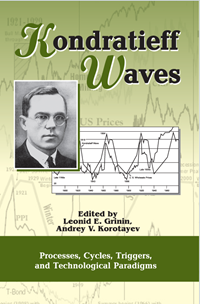
|
Kondratieff waves:Processes, Cycles, Triggers, and Technological ParadigmsBibliography: Volgograd: ‘Uchitel’ Publishing House, 2022. – 208 pp.
Edited by: Edited by Leonid E. Grinin, Andrey V. Korotayev
ISBN 978-5-7057-6191-3 Editorial Council:
Askar A. Akaev (Russia – Kyrghyzstan), Brian J. L. Berry (USA), Valentina M. Bondarenko (Russia), Tessaleno C. Devezas (Portugal), Claude Diebolt (France), Sergey Yu. Glazyev (Russia), Ruslan S. Grinberg (Russia), Bert de Groot (the Netherlands), Masaaki Hirooka (Japan), Boris N. Ku- zyk (Russia), Witold Kwasnicki (Poland), Francisco Louçã (Portugal), Vladi-mir I. Mayevsky (Russia), Leo Nefiodow (Germany), Carlota Perez (Venezuela – UK), Sanjay Prasad (India), Arno Tausch (Austria), William R. Thompson (USA), Andrew B. Tylecote (UK), Yuri V. Yakovets (Russia) |
March 17, 2022, marks the 130th anniversary of Nikolai Kondratieff's birth. In addition, this year also marks the centenary of the publication of his monograph The World Economy and Its Conjunctures During and After War (1922), where he first formulated the idea of long cycles, which later became known as Kondratieff cycles, or Kondratieff waves (or just K-waves). Since then, the issues of the mechanisms generating economic long waves (cycles), the causes of the regularity of the alternation of Kondratieff upswings and downswings and the relative stability of the K-cycle period have become very interesting subjects for many researchers in the field of economics and social sciences. In fact, the study of K-wave dynamics has become a special field of interdisciplinary research, which, of course, shows the great importance of the further research on the K-wave phenomenon.
This sixth issue of the Yearbook ‘Kondratieff Waves’ has the subtitle ‘Processes, Cycles, Triggers, and Technological Paradigms’. Its papers cover some interesting aspects of long-wave dynamics both in historical trends and theoretical researches. The Yearbook consists of three sections. The first section (Processes and Cycles) includes four contributions. Most of them are devoted to long cycles. The second section (Kondratieff Medal 2020: Winners' Speeches) presents six articles of N. D. Kondratieff medal laureates. The final section (Essays and Reviews) includes four articles devoted to the first, second, and third technological paradigms interrelated with the first, second, and third Kondratieff waves. It also includes George Lawson's review of Handbook of New Waves of Revolutions in the 21st Century: The New Waves of Revolutions, and the Causes and Effects of Disruptive Political Change published by Springer International Publishing.
This issue will be useful for economists, social scientists, as well as for a wide range of those interested in the problems of the past, present, and future of global economy and globalization.